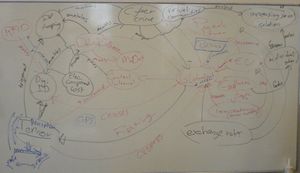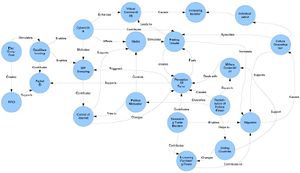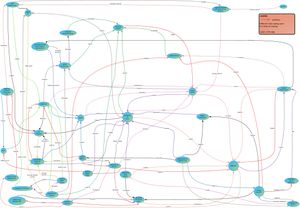Difference between revisions of "The Future of Privacy in 2015"
| Line 136: | Line 136: | ||
<h2 style="background-color: #F5F9FA; border-left:1px solid #AAAAAA;border-bottom:1px solid #AAAAAA;border-right:1px solid #AAAAAA; padding-left: 10px;">Scenario 3</h2> | <h2 style="background-color: #F5F9FA; border-left:1px solid #AAAAAA;border-bottom:1px solid #AAAAAA;border-right:1px solid #AAAAAA; padding-left: 10px;">Scenario 3</h2> | ||
<strong>""</strong> | |||
<p> | |||
This 3rd scenario is based on the future with low level of privacy in the world where global cooperation wasn’t really developing and stayed in almost the same level as it is now. | |||
</p> | |||
<p> | |||
Today with growing economy level in so called “developing” countries the amount of emigrates will slowly decrease. This will lead to several changes in different sectors. First of all, with increase of living standards and spare time, people will be more able to use communication technologies and media. The result of increase in those areas will be huge invasion into personal privacy. Interruption of privacy at that moment will be not only because people are able to do that, and they are curious in others personal life, but also because of today politics there will be intervention. In other words there is a growing protection from terrorism: so called “world protectors” and “anti-terrorists” are searching all over the world the dangerous information. This is done without yours personal permission and there is nowadays almost no protection for that. Besides that, the new safety video cameras are working with the same idea: intervention into yours privacy without yours admission to protect from possible damage or danger. Additionally, politics very often not only misinterpret but also misuse information. To conclude, privacy invasion is grown to a new level: from leisure to protection from possible danger. | |||
</p> | |||
<p> | |||
The other point necessary to mention is, that people nowadays don’t really care how much and how personal/ important information they put for example on the internet. As mentioned before, politics often misuse the information, but there are many other segments where unsafe information could be used. Of course, the information can be used not only for damaging, but some people can gain advantage of it, like personalized advertisement or helping with tax filling (for example DigiD in the Netherlands). | |||
</p> | |||
</p> | |||
With growing software and hardware and other many technologies the level of protection will be not enough to secure it. Constant hacks into sensitive databases will lead to decrease of retained information. Of course with possible transparency the level of interventions could decrease, and everybody in “illegal” privacy activities will be caught. Unfortunately the cyber-crime (phishing, hacking, scripting, malicious code and spamming) is still growing. The data can be 99% secure, but the possible brake into especially important information can cause really big damages. | |||
</p> | |||
<p> | |||
Adding to this point, people, who are willing to save time on online activities: web-shopping, banking, phoning, upcoming world-passport, etc. need to give up a lot of necessary (or not) personal data. This leads to riot of privacy issues: people who are involved directly and understand the importance of shared information aren’t willing to distribute it. Within this scenario they will suffer the most. Others are not interested yet, but they will get the grunt of privacy issues too. This should lead to new laws for protection of privacy, but the basic damage is already done. | |||
</p> | |||
<p> | |||
To conclude, within this scenario, in around 2015 the regular people will suffer the most. Thought the criminals will have huge advantages of it.</p> | |||
<!-- | <!-- | ||
<hr /> | <hr /> | ||
Revision as of 06:37, 5 April 2007
Introduction
Research & Information
- Questions regarding the Future of Privacy
- Sources of information and interesting links
- GOOGLE VIDEO: The Power of Nightmares 3 of 3 - In this eye-opening video, a more realistic view is given of terrorism, and the 'War Against Terror'
Driving Forces
Driving forces categorized by PEST factors method.
Every driving force in the categories below are built up out of predetermined constituents: Description, Enablers, Inhibitors, Paradigms, Experts, Timing, and Web Resources
Political
New
- immigration - Growing immigration in the western countries
- European_Union - Growing European Union
- cybercrime - Upcoming internet criminality (cybercrime)
Existing
- War on terror - War on terror
- Terrorism - Terrorism
- Global Terrorism - Global Terrorism
- Control of the Internet - Control over the internet
Economic
New
- Electrical component costs - Cheaper integration of cameras or audio-recording equipment
- Disclosure for tax purposes - Information disclosure
- Exchange rates - Cheaper wholesale of electrical components, leading to cheaper integration
- Purchasing power - A country with high purchasing power can spend more on invading or preventing physical invasion of privacy
Existing
Social
New
- Globalization - improvement on existing Driving Force
- Curiosity to cultural differences
- Increasing individualization
- Increasing Demand for new types of entertainment
Existing
- Mobility
- Increasing social isolation
- The Globalization of Culture (or Cultural Globalization)
- Community Feeling
- Chinese people's increasing leisure time
- Movement Towards World Unification
- Urbanization and Social Status
Technological
New
Existing
- Virtual Communities
- GPS Evolution
- Increasing Use of e-Commerce
- The Increasing Use of Internet
- Reduction of organizational and technological complexity
- The war on Spy- and Ad ware
- Whereabout the fourth generation mobile technology
Diagrams
Systems diagram
Version 1 - 'Brainstorm' edition
In order to start creating a system diagram, the initial, unmodified driving forces were mapped into a 'brainstorm' system diagram.
This version seemed to revolve around two concepts; Globalization and Terror(ism). Feedback provided lead to the conclusion that:
A) Globalization should be split up into more defined driving forces
B) Globalization and terrorism are on their own very complex topics at this moment, so they require further in-depth research.
C) Politic, as found as a driving force, is a category. An actual driving force must be specified from this category.
Terrorism is something most people associative with the rhetoric as presented by the media, however, there is a difference between the reality and the rhetoric. Our task is to find our the difference so we can correctly find some distilled driving forces.
This version will be improved upon once the extra research has been completed and posted as version 2 below.
Version 2 - Completing
This is the second version of out system diagram. The two centered spots we had in the first diagram are now worked out. We changed 'terror' in 'perception of terror' and 'Globalization' is worked out in several new parts. A lot of aspects still missing though.
Planning for version 3:
- Clear inhibitor/enabler distinction
- Improved edge naming
- More driving forces
- Logic fixes
Version 3 - Semi-Final
This is the semi-final version of the systems diagram. Messy, but complete. However there is always room for more loops and additions, but through feedback loops and other control mechanisms we managed to keep it to a minimum.
Scenarios
look forward to seeing them, like how you are getting to the bottom of this issue!
Scenario 1
"Closeness from seclusion"
In 2015, everybody is aware of their own status of privacy, and in full control of it. Laws are in place to protect personal information, allowing information only to be used for the exact purposes it was given out for by the owner. Technology has made it possible to transmit and store information in utter privacy, while new-age complex encryption technologies make this possible. People carry their private information with them in transmittable format at all times. Also, physical privacy is improved with devices to scramble electronic signals, being able to create Faraday-like cages around personal areas.
People feel safer as they know exactly what is known of them by whom, when and where.
Laws are in place to protect people’s privacy unconditionally, also when moving around, which makes migration between different countries a political nightmare, but due to high global cooperation, this problem was solved as governments worked together to agree on wide-spread privacy laws.
Around 2005, personalized advertising was thought to be the future. However, with the new privacy laws and people being critical of who gets access to their data, there is no room for personalized advertising. Advertising stagnates. Since technology has made it near impossible to create online advertising, it is a marketing-man’s nightmare. Economic recession follows shortly for a brief period of time as retailers recover and fall back to more primitive methods of marketing. The vast growing network of virtual communities is inhibited as no data is communicated and the communities are very impersonal. People are weary of spreading their personal data and hold onto it very well, leading to social interruption, individualization and isolation.
As data is not kept, or may not be kept without permission, bureaucratic practices are rising. Constantly having to ask permission for everything and from multiple people increases the amount of communication needed per transaction. Thankfully, technological advancements in communication compensate for this reasonably well.
Perception of terror has been limited to more reality and less speculation and media-induced ideology. The hype has been suppressed. How could anybody possible still attack me? They don't know anything about me!
I love how we've gotten so close.....what's your name again?
Scenario 2
""
The year is 2015. As the world was changing fast for the last couple years, privacy eroded slowly. Governments are connecting throughout the entire world, not only the EU is rapidly growing, also there are incentives to connect the EU to the US. Cultures came together and cultural differences slowly changed and overlapped which leaded to individualism. The amount of immigration was slowly taken back just because of the globalization and uniting countries. Extremism and crime was slowly taken down by the integration. People got very happy as they were feeling very safe in a world with less terror and crime.
New technologies came available which made everyone and everything traceable. The amount of privacy was therefore lowering but almost nobody was caring as long as they were safer. All the uniting countries agreed on one global data warehouse and a world identity. Due to this traceability almost all (cyber)crimes were solved and SPAM was not possible anymore. The use of internet got a more important role in the world society. Everyone has a virtual identity which is not only used for playing games but also virtual businesses are rapidly growing. Internet made it possible to store exchanged information. Phone calls were only made via VOIP. Other technological evolutions were used to integrate people among various ‘countries’. Digitalizing the world took care of disappearing brick and mortar shops. The internet was now the way to do your shopping and as it evolved the amount of literacy found in a ‘normal’ book format was brought back to only a few. The digital literacy period has been entered where every information and book you wanted to read was for free available. All these information could more easily be found as you credentials and information searches were profiled on the internet with public access by companies.
The political power was equally divided, which got some resistance from the largest former countries in the world. The world got into economic recession but was slowly recovering as the politicians agreed on changing laws and making things more globally.
Scenario 3
""
This 3rd scenario is based on the future with low level of privacy in the world where global cooperation wasn’t really developing and stayed in almost the same level as it is now.
Today with growing economy level in so called “developing” countries the amount of emigrates will slowly decrease. This will lead to several changes in different sectors. First of all, with increase of living standards and spare time, people will be more able to use communication technologies and media. The result of increase in those areas will be huge invasion into personal privacy. Interruption of privacy at that moment will be not only because people are able to do that, and they are curious in others personal life, but also because of today politics there will be intervention. In other words there is a growing protection from terrorism: so called “world protectors” and “anti-terrorists” are searching all over the world the dangerous information. This is done without yours personal permission and there is nowadays almost no protection for that. Besides that, the new safety video cameras are working with the same idea: intervention into yours privacy without yours admission to protect from possible damage or danger. Additionally, politics very often not only misinterpret but also misuse information. To conclude, privacy invasion is grown to a new level: from leisure to protection from possible danger.
The other point necessary to mention is, that people nowadays don’t really care how much and how personal/ important information they put for example on the internet. As mentioned before, politics often misuse the information, but there are many other segments where unsafe information could be used. Of course, the information can be used not only for damaging, but some people can gain advantage of it, like personalized advertisement or helping with tax filling (for example DigiD in the Netherlands).
With growing software and hardware and other many technologies the level of protection will be not enough to secure it. Constant hacks into sensitive databases will lead to decrease of retained information. Of course with possible transparency the level of interventions could decrease, and everybody in “illegal” privacy activities will be caught. Unfortunately the cyber-crime (phishing, hacking, scripting, malicious code and spamming) is still growing. The data can be 99% secure, but the possible brake into especially important information can cause really big damages.
Adding to this point, people, who are willing to save time on online activities: web-shopping, banking, phoning, upcoming world-passport, etc. need to give up a lot of necessary (or not) personal data. This leads to riot of privacy issues: people who are involved directly and understand the importance of shared information aren’t willing to distribute it. Within this scenario they will suffer the most. Others are not interested yet, but they will get the grunt of privacy issues too. This should lead to new laws for protection of privacy, but the basic damage is already done.
To conclude, within this scenario, in around 2015 the regular people will suffer the most. Thought the criminals will have huge advantages of it.
<pagerating from="Poor" to="Good" category="Scenario"> Rate this page</pagerating>



